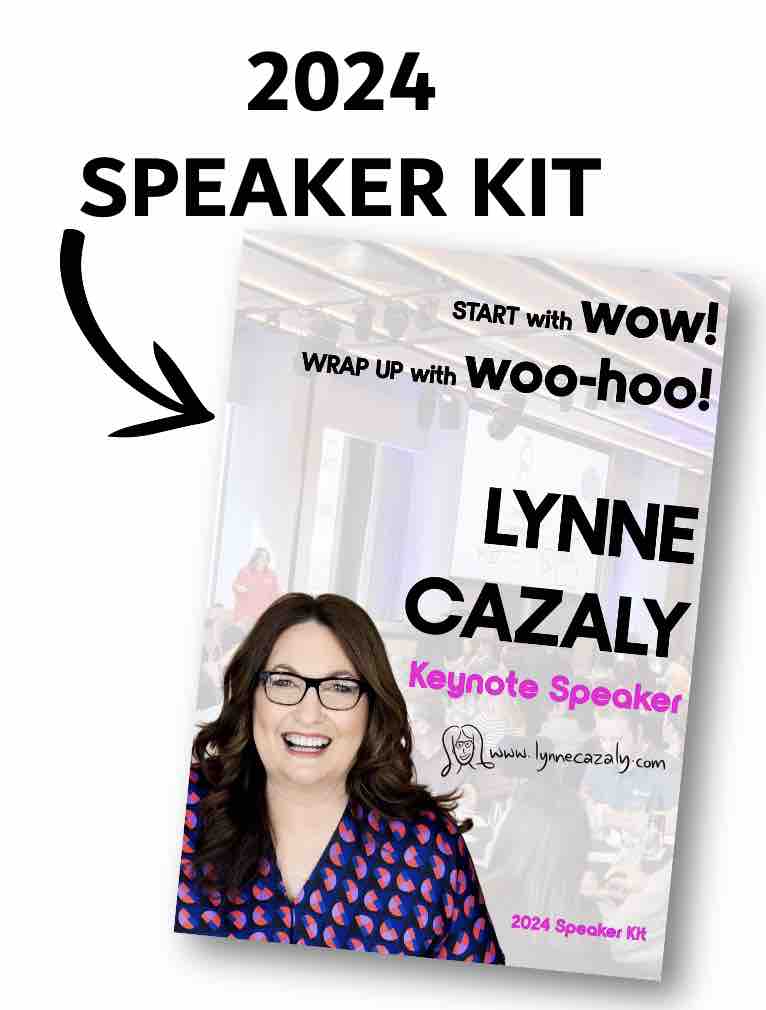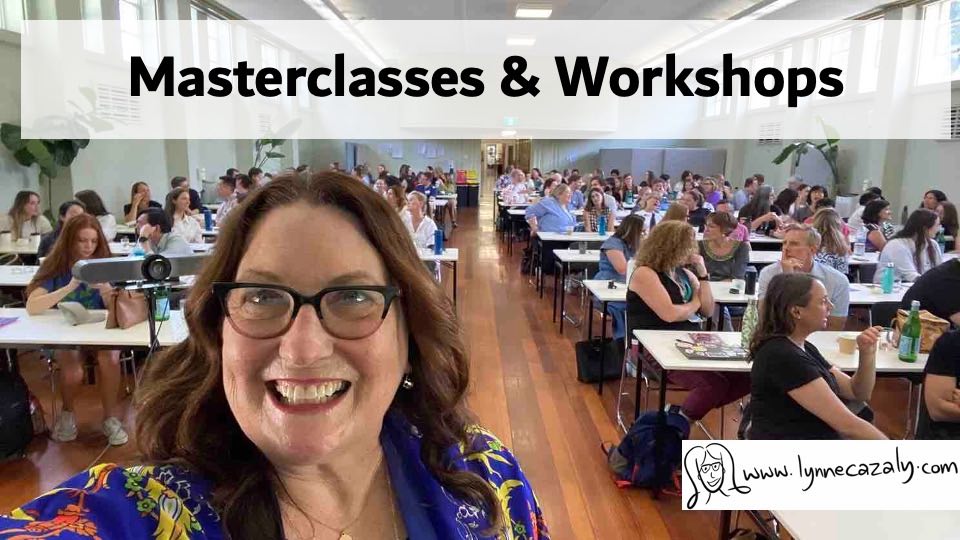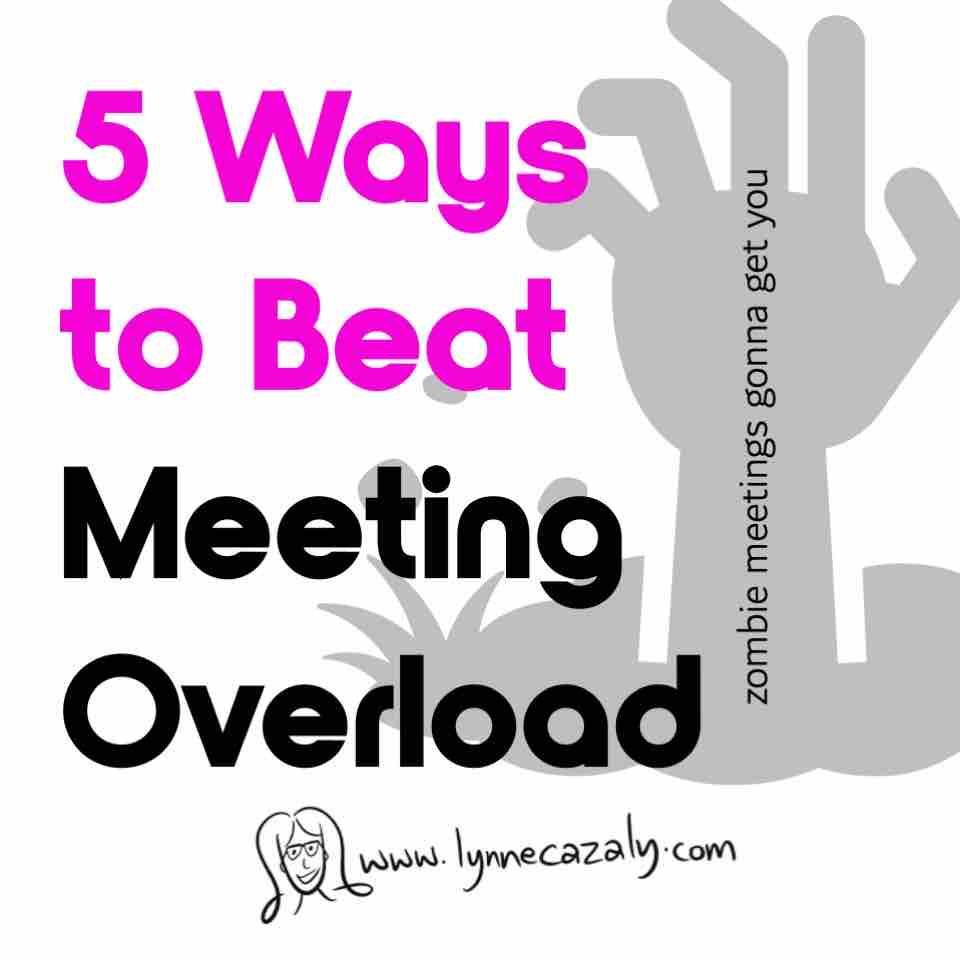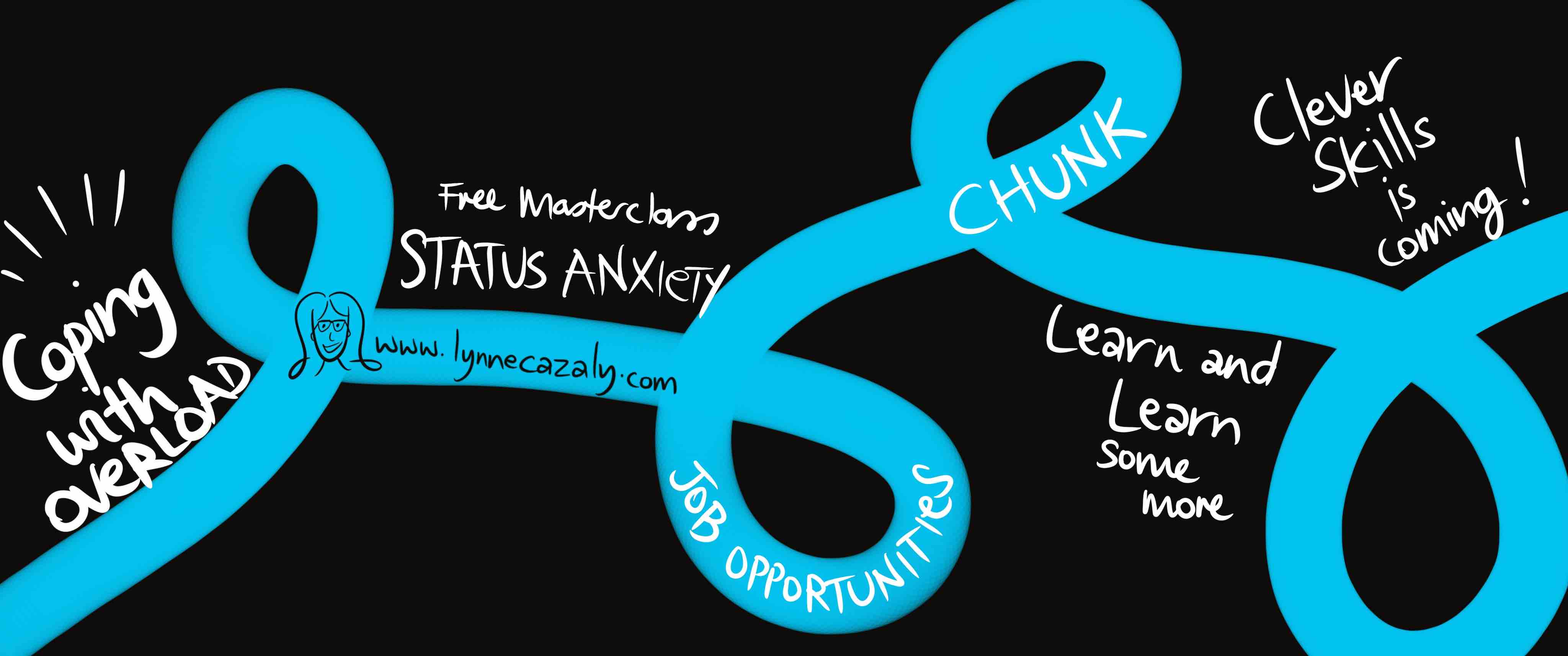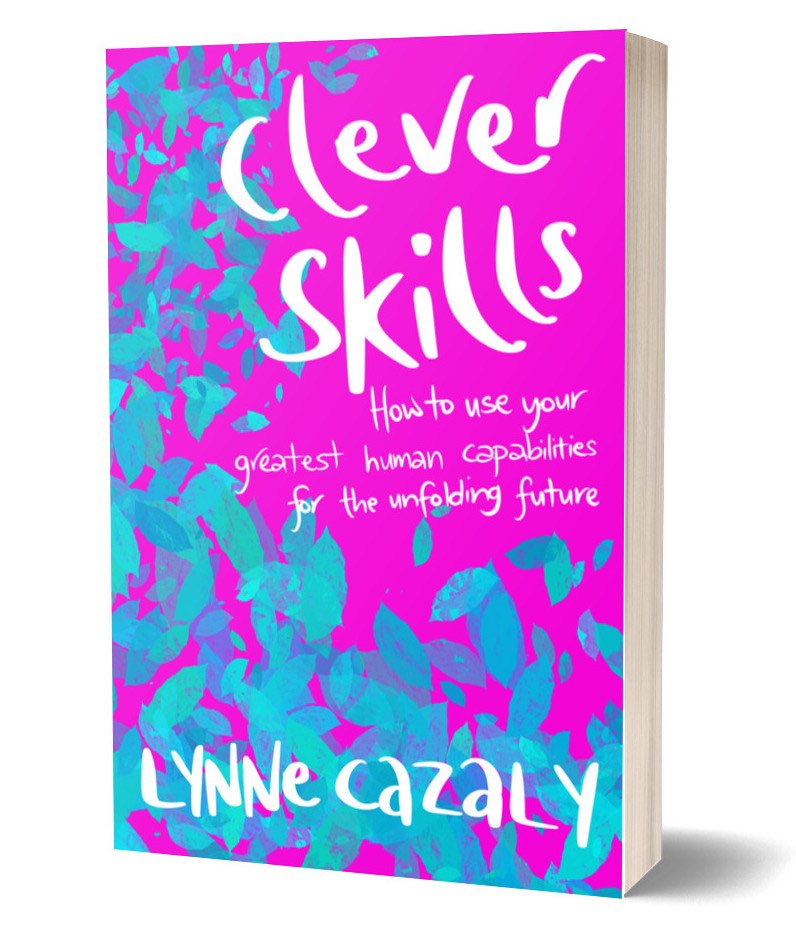Coping with overload / Status anxiety /Job opportunities / Chunk and Learn and Learn/ Clever Skills coming
 Friday, March 15, 2024 at 12:57PM
Friday, March 15, 2024 at 12:57PM Answers to overload
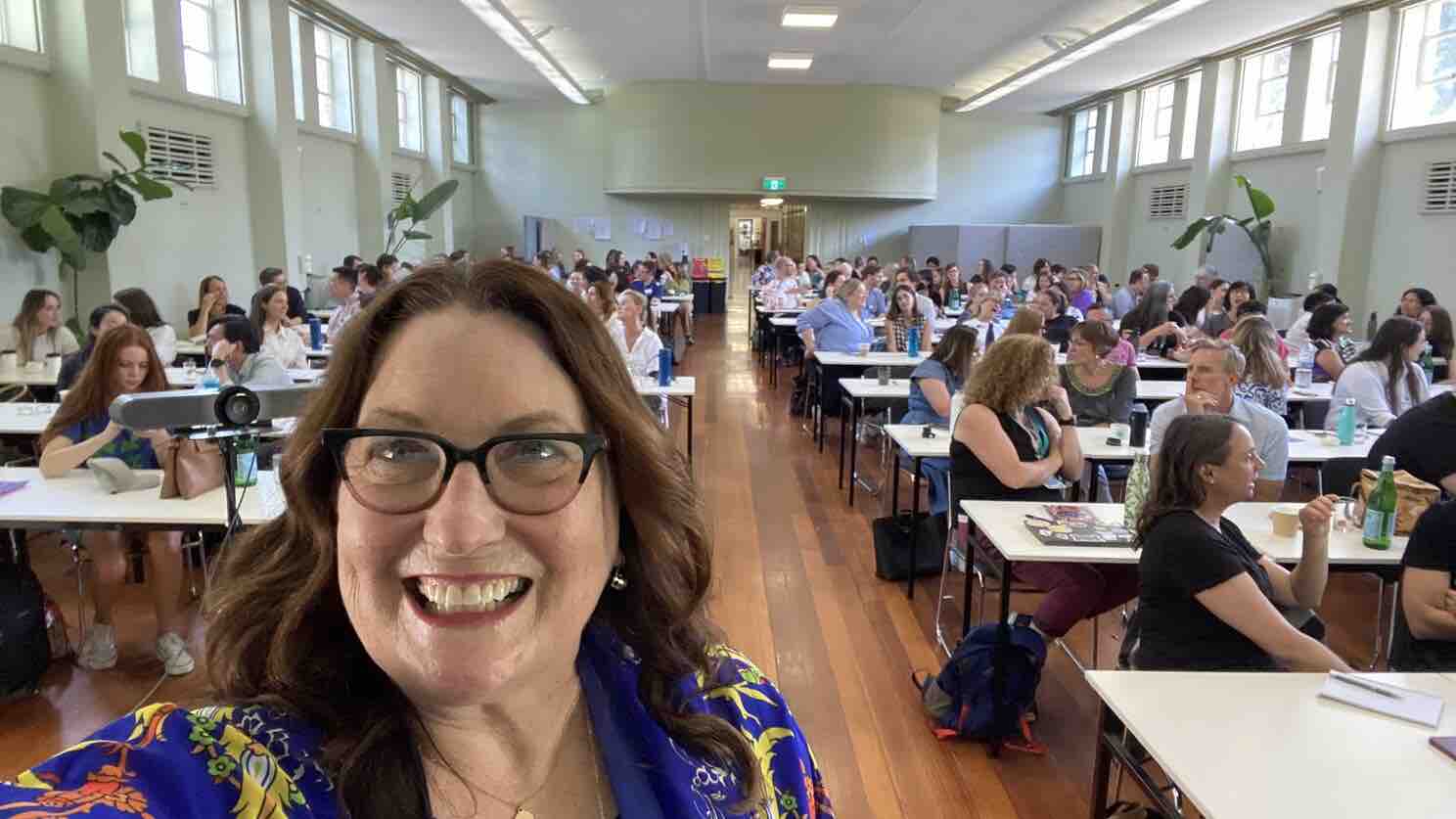 In the work world of too much information, it doesn't take long before we feel the effects of cognitive overload.
In the work world of too much information, it doesn't take long before we feel the effects of cognitive overload.
The pace and amount of information isn't slowing down, so we have to adapt to cope. Meetings, conversations, presentations, learning, to do lists, project tasks … there’s just too much to carry. Everyday.
The information deluge is forever incoming. And AI is creating more information to review, make sense of and filter.
Our mind space is limited. And when we don’t use that space well, we experience overload.
Conferences, offsites, team days and information-based events (remote or in person) create the perfect — and challenging — conditions for information overload.
I worked with a team recently who want to make this a focus for development this year.
They’re tackling overload and kind of saying, ‘no more; we need to do something differently.’
And our everyday life isn’t easier. We’re frequently drowning in the deluge of scrolling, reading, listening, shopping, packing, travelling and planning.
But we don’t need to suffer … or give up. There are techniques and practices that help give us a clearer mind and an optimistic outlook about all that information and what to do with it.
My new OPENING KEYNOTE for conferences, events, offsets and team days is a winner. It sets you up to get the most out of the day, 10x your learning takeaways, and makes you feel better at the end of the day.
Enquire now about these vital skills for your team, people and organisation.
Where the job opportunities are
The short answer is: everywhere.
The longer answer is: jobs will continue to be needed.
As investment, opportunities, ideas and innovations emerge and evolve, new and additional careers will rise to the surface. And keep on emerging and changing.
As we need more and different things in life, we may outsource, delegate, distribute or invite others to help us with those things. To design them, collaborate, create, make or innovate them.
And we may not know what they are right now. But cycles come and go, rise and fall, ebb and flow.
Keep in touch with what’s changing and how it might impact your career — or the path you’re on right now, and where that path may lead.
Read more from the World Economic Forum in this article.
Do you chunk
Dealing with information overload is a daily battle. Some things are most certainly worth remembering - while others are just … meh. Nope.
To help handle the load, chunking is still right up there with one of our greatest memory tools. Think mobile numbers, account numbers or other memorable details; they’re best recalled in chunks or small blocks.
And while some data doesn’t need remembering these days thanks to facial recognition or fingerprints, there’s some unique-to-you information that is worth retaining. Your expertise.
Don’t be too quick to delegate all of your ideas, information and experience to artificial intelligence.
You have case studies, stories, experiences and know-how that is worth remembering and reincorporating into your work, career and life whenever it’s required. Public speaking, coaching and leading are some situations where being able to draw from your memory could boost results and outcomes. And chunking could help with the recall.
Read more here in this article.
Learn … and keep on learning
Our ability — and willingness — to learn really is one of our most wonderful capabilities.
Our capability to become more capable!
The world needs us to keep on learning. Don’t stop. It’s about becoming a renaissance person. Read on.
New book coming - pre order
Hello. How's it going? As the future arrives faster and faster, with more automation, artificial intelligence and augmentation than ever, how do you plan to adapt?
Do you know … or are you going with whatever happens happens?
While FOMO (fear of missing out) can be strong in life, there is an increasing and real FOBO (fear of being obsolete).
Our desire for relevance, meaning and purpose is strong. But is this default strong enough to handle the dizzying changes as they arrive and unfold?
3 questions for you:
1. How will you stay relevant?
2. How will you adapt your career so you are employable -- yet retain meaning in your work?
3. What will you need to do to stay with (and ahead) of changes in your industry, field and domain?
I am obsessed with picking trends, spotting themes before they are mainstream, and then adapting myself, my business and life to these shifts.
Here’s a project I’ve been gathering and curating over four years : CLEVER SKILLS: How to use your greatest human capabilities for the unfolding future
In Clever Skills I share 25 capabilities that will take you through times of rapid and/or mind blowing change.
With wise counsel and insights and experience from leading in companies, mentoring more than 150 business owners and developing teams and leaders, I’ve curated an in-depth list of clever. It’s presented as an easy-to-follow 'life-side-guide' on what to do now, next and in the unfolding future.
Pre-order at a special pre-order price
🥏 Released May 1, 2024 Unless the future unfolds even faster 😜
🥏🥏 Pre order the paperback here
NEW SPEAKER KIT
Looking for a speaker for your offsite, team day, conference or event, get my 2024 speaker kit with details on:
- Opening Keynote on Cognitive Load Coping
- Plenary and Masterclass Topics
- Closing Conference Session - The Co-Creation Experience TM
Meaning of work/Not know and be ok/Art, Creativity & Science/Leaping this year
 Thursday, February 8, 2024 at 8:45AM
Thursday, February 8, 2024 at 8:45AM 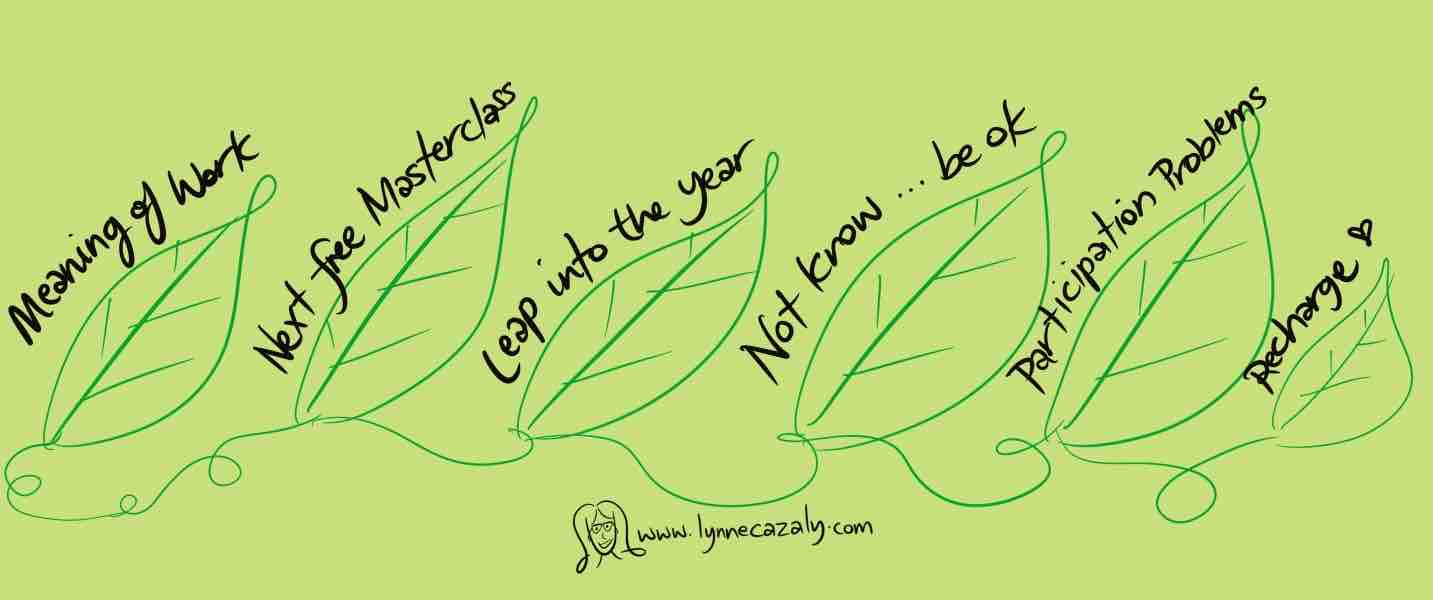
What does your work mean to you
It's always a good time to think about what you want from your work and what you work gives you.
Work, workplaces and the world of work is changing -- and continues to change. And you might need to adapt or change what you do for work or how you work.
Read more in this piece from Psychology Today and take another look at the meaning of work and how things might, possibly, be able to shift for you.
Not know and be ok with that
It sounds unusual but we can be bored and frustrated... and it can be ok.
We can be caught up with wanting to feel wonderful and put-together all the time, but there are benefits to these other states.
This is a reminder for me frequently; to not keep pushing and busy-ing but to let the uncertainty or unknown of boredom, irritation and frustration be a place of great things.
Read more in this article
The art, creativity and science of …
It’s summer here in Australia and for those who get annoyed by it … there can be ‘sand everywhere!!’
No matter your season, take a moment to feel the sand between your toes in this lovely read of the art and science - and creative uncertainty - of sandcastle making.
There are themes here of
▫️Philosophy
▫️Impermanence
▫️Uncertainty and that which is outside of our control
▫️Resources and sustainability
▫️Ingenuity
▫️Friction and
▫️Tension.
Thinking of making a leap this year
Career changes, pursuing that which you’ve always had an interest in, or just thinking it’s time for a change.
Making a leap into a new way of working can mean a career or job shift — and that can mean working for yourself, registering a business or taking a whole new work direction.
What are you thinking about work … and how might things be new for you this year?
This article in The Age shared some inspiring examples of what's possible and practical and implementable, not just what is a faraway dream.
Some Seasonal Readings from Lynne Cazaly
 Monday, December 18, 2023 at 5:41PM
Monday, December 18, 2023 at 5:41PM 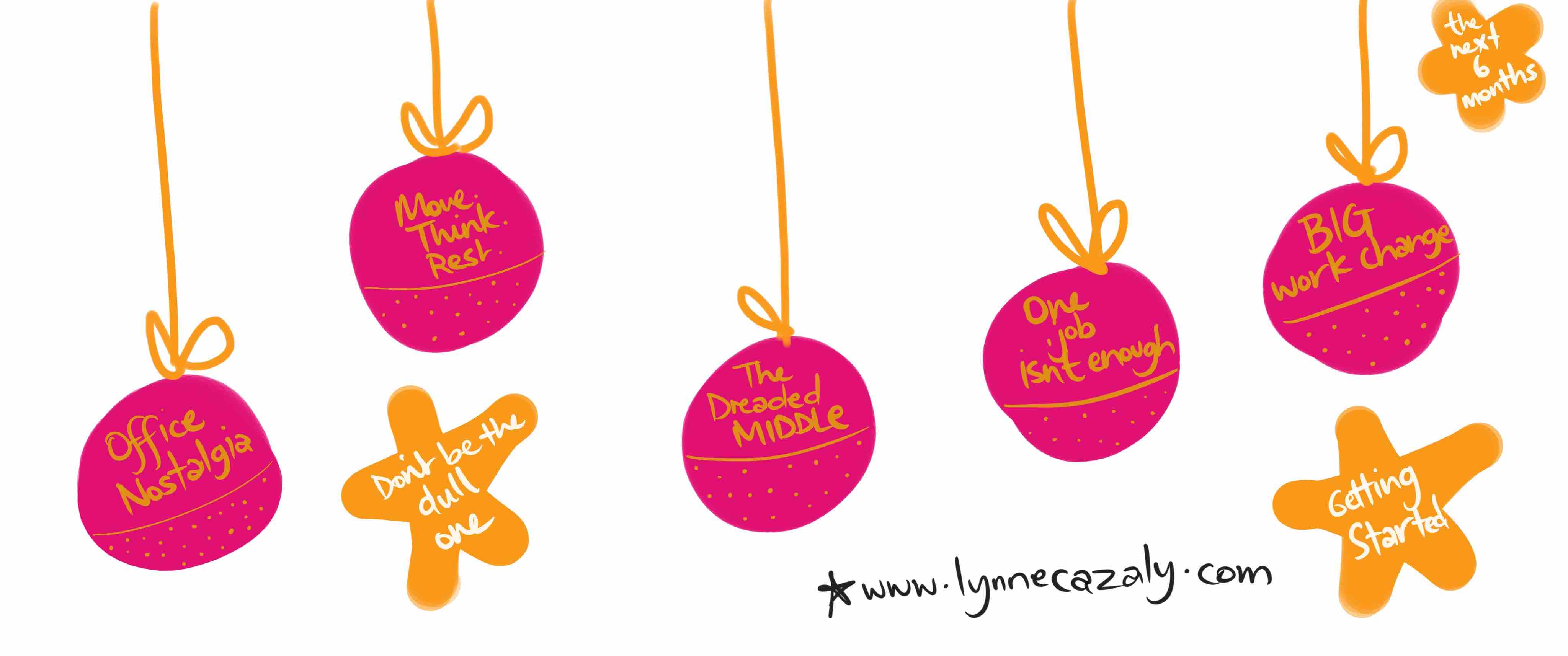 How office nostalgia keeps us stuck
How office nostalgia keeps us stuck
Some businesses and leaders just aren’t letting go of their return to office mandates and attendance requirements.
And we might be understanding some further reasons why they’re holding on so strong.
Memories, nostalgia, legacy and a sentimental history could be part of what’s keeping organisations stuck from evolving towards more modern work.
How? When so many people grew through their career working in an office — or a business or organisation that had a head office — changing that deeply historical mindset towards the office is what’s tough to shift. Memories of the good old days and the great times working in the office pre-pandemic could be a deep reason why some people/leaders/cultures are battling to evolve to newer ways of working.
Remote, flexible, asynchronous, hybrid and non-linear work are all part of the new way of working. Yet nostalgia can be strong.
Memory biases like Rosy Recollection, Episodic Memory, Recall Bias and Selective Memories all contribute to how we perceive the past and the present. And the way we see the office is a big one of those perceptions.
What to do?
🟨 Bring creative thought to combine old ideas into new original ones; be willing to experiment more with different approaches, pilots and techniques about modern work.
🟨 Don’t assume you’ve got it perfect and right after your first attempt at a hybrid model. Increments and iterations are part of new ways of working.
🟨 Look beyond leadership perspectives. Get more ideas and input from across the organisation. Consult further. Be willing to ask for opinions. No one view is right.
Being stuck in old ways of working comes about because of old systems, structures, mindsets and fears — masquerading as leadership, compliance and control. There’s so much more to new ways of working than how many days you return to a nostalgic office.
Read more in this Work Design Magazine article by Cynthia Milota and Jinger Tapia
Move think rest
New ways of working don’t just change businesses. They’re helping change people and the way they think, work and lead.
If you haven’t changed much about how you work since … well, since you learned how to work, it might be a good time to.
New ways go beyond the obvious stuff that’s changed work recently like technology or even increased remote work.
Look deeper and you can begin to redesign the way you think, the way you interact or collaborate and work with others and the way you lead a team.
The idea of ‘movement thought rest’ or MTR/motor framework shines a light on how the go go go push push push of work is an old old old way of working. Yes, ‘pushing through’ is very much an old way of working or thinking about the work we have to do.
Old metaphors, methods and models of work are breaking down in favour of more modern concepts that bring greater sustainability, wellbeing and enjoyment … to the whole of life.
Read more in this article in Fast Company and think about how you could be making the old ways of working a little more modern.
The dreaded middle
You might wince when you see a boarding pass for a flight that has you in the middle seat or realise the discomfort that’s ahead as you walk down the aisle.
Memes, stories and experiences abound on the tricky situation being ‘stuck in the middle’ can have: complex armrest rules, violated leg space, no quiet privacy, and gymnastics for getting in and out over sleeping peoples.
That’s indicative of other middle locations — particularly in today’s workforce.
The challenges of middle managers trying to survive the sandwich pressures of above and below have led to more stress, conflict, burnout, less satisfaction, layoffs, pay cuts, inflexibility …
The middle may have become more of a crowded cliff as lower levels have been pushed up into the space and higher levels slash and burn that which is below.
Research quoted in Fortune by Chloe Berger makes me wonder if the uncomfortable middle people might be rethinking who and what they want to be, where they want to be it … and how soon they can start making that change. The messy middle has become an even more turbulent space to be in recent times.
When one is not enough. Jobs that is
Many people may well be drowning under the weight of the responsibilities of one job role plus … you know… life.
And a good many people take on a second job to fill gaps in needs, meet their basic financial commitments or to build for their future.
But there’s a whole other world of the ‘over-employed’ who are working their work gigs to the max.
These eye opening accounts of how people take on, juggle and handle multiple job roles, reveal the hacks, tips, hints and tools used to put one over the employer … while you take two or three for yourself!
With recent years’ rise in remote work, stories of dual (or more) jobs held by one person were rumoured and reported on — but now there’s more insight into how it’s actually happening.
Before you get all “that’s so wrong” or “good for them” about it, read more to see the situations, skills, roles and reasons this is happening.
It’s another trend in response to the evolving nature of work.
While the underemployed people in our communities struggle to find suitable, flexible and reasonably paid work, there are many who are rising through the multiple job roles ranks.
And while there are tips here on how to do it… there are also some handy insights on how to spot it if it’s happening in your team or business.
Read more in the article by Aki Ito in Business Insider.
The BIG work change hiding in plain sight
As newer ways of working have reached many sectors and businesses, there’s still much to do. Many leaders still aren’t quite sure though, how to change work to adapt to the recent pressures of stress, burnout, flexibility demands and global pressures.
Lynda Gratton always seems to know just what to say! In this great article you’ll see some key points and suggestions about adopting new ways of working and redesigning work.
BUT … what about the HUGE point that could be getting in the way of change?
It’s right there… hidden in plain sight - that we can’t and shouldn’t be adopting or following the CEO’s default preferences for ways of working!
Yep, that’s a big status role in the organisation to influence and challenge … but well-being, productivity, engagement and success depends on it.
So many organisations find a shift to new ways of working challenging and full of roadblocks because of C-level attitudes and dated ways of thinking about work.
They often ‘know what’s best’ from their ‘experience’ - but that experience is rapidly becoming out of date and gained in a different era of work. I see this so frequently when I speak to senior leadership teams about new ways of working. I spend time guiding them through the ideas, evidence, methods and shifts they need to adopt to change and redesign the way their organisation thinks about work. And sometimes that’s a tough gig.
Attitudes and beliefs run deep.
And they want to minimize the risk, know that it WILL work before they adopt new ways.
But new ways are very much a new way of
▫️Thinking
▫️Working and
▫️Leading.
And it’s tough when that thinking gets blocked at the top.
We can help break through the blockades of dated experience that could be hindering how your organisation thinks about redesigning work.
Don't be the dull, ineffective one who leads
A meeting leader can often help find a path of progress through a meeting, is able to handle the agenda (or even no agenda!), the behaviours in the group, the barriers to progress, AND the obstacles to having a productive and successful team session.
That's a lot to juggle; no wonder meetings continue to be dull wastes of time. So it's possible .... that we could be leading dull, droning, ineffective meetings. Well, somebody sure is!
Lifting your leadership here -- where people get together to do work -- can make a huge shift in performance, engagement, morale and communication.
Join me live online, for this professional development session.
Build your facilitation skills session so your meeting leadership becomes more:
🌑professional
🌒collaborative
🌓effective
🌕productive.
Oh, and let's add creative to that too, as I'll include a range of creative ideas to boost any dull meeting or gathering.
More details here on dates, times and pricing.
And if this is something your team or organisation needs, let me know - I can deliver it inhouse, remotely too.
Getting started
If you’ve got plenty of ambivalence/meh and not enough motivation, perhaps this way of thinking and working can help.
Notice the difference between
🔆 motivation : that longer term energy and drive that keeps you going
🔆 activation : the tactics that get you started on something, and headed toward motivation.
I’ll frequently hack my activation for work by:
🔆gathering ideas when they pop into my head
🔆brainstorming some possible content for a keynote as soon as the enquiry comes in
🔆following my curiosity when I’m thinking about a topic and
🔆choosing the nicest task possible from a list of things to do for a project (like playing around with the book cover design over researching a dry topic.)
Momentum is joyous when you’ve got it. Just ask a kid on a swing.
But if you haven’t got it, how do you get started?
Find the thing that will get you going. Once you get going — activated — you may feel some more interest or purpose and energy for the work — motivated.
As we learn more about how we think about work and how we work best, the difference between activation and motivation can become enlightening… and mighty empowering.
The ‘meh’ feeling is nothing to feel bad about. Look for the things, tasks, hacks and tips that activate you … towards finding some motivation.
3 Mentoring spots available
As the end of year approaches I’ve got availability to work with 3 people 1:1 in mentoring over the next 6 months of 2024.
If you run your own business, run your own practice or are keen to build and grow, let’s talk about getting 6 x 1:1 sessions (+ other support, clever ideas and resources including my book writing program) locked in.
Message me about the first 6 months for 2024.
Protect ideas/Do you Kanban?/Workshops in Sydney... and New Zealand/The Great Room
 Monday, September 4, 2023 at 4:37PM
Monday, September 4, 2023 at 4:37PM 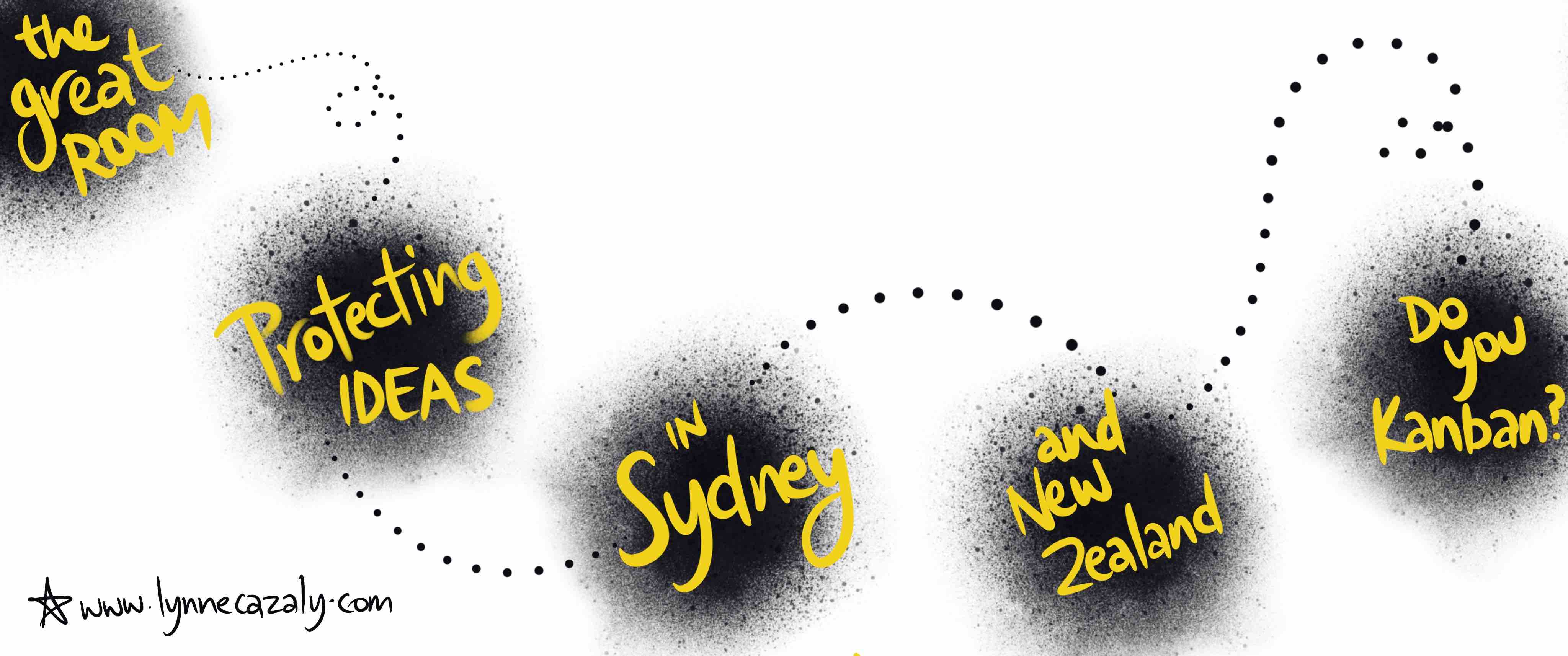 Protect the airspace around ideas
Protect the airspace around ideas
Sharing ideas with coworkers or colleagues can be an exciting time. You’ve had an idea and you want to verbalize it or explain it, explore it a little more.
But some people have that unfortunate wet blanket ability to cut down and dismiss ideas in three seconds flat! Their techniques might not be the old clichés of ‘we’ve tried that’ or ‘that won’t work’.
No, today’s idea deflaters are a little more insidious and subtle than that. Because the first thing you’ll notice is the inspiration you had for the idea has rapidly deflated and the focus is now directed elsewhere. The vibe has gone.
It’s like the time, space and idea has been hijacked.
Idea hijackers love to:
▫️contribute immediately with something they know or have done, ahhh, also known as ‘interrupting’.
This behaviour:
▫️deflects from your idea, and
▫️distracts with new information about something, somewhere or someone else.
They might keep hijacking when they:
▫️ elevate the something or someone else higher, greater and better than your idea
▫️ provide unsolicited comparisons
▫️ rush to premature solutions and conclusions, and
▫️ move the conversation on to other topics.
Boom. Slash. Switch. Sleight of hand and verbal misdirection. All the while, they’ve ignored that which was in front of them: you the human, and the idea you shared or expressed. Tune in to it. Notice it. The status shift in the conversation or interaction is observable and palpable.
Idea slashers get away with their frequent whipper-snipper action as if it’s just how things are these days.
No wonder people don’t feel safe sharing their thoughts and ideas, contributing or participating. Whether it’s ego, discomfort, narcissism, a desire to show their knowledge and power … whatever it is…It’s a perfect reason why collaboration and conversation often needs to be moderated, facilitated and ‘air traffic controlled’ to keep a watch for these rogue craft infiltrating protected airspace!
Rather than rushing to fix, shame or remediate the hijacker/interrupter, stand by and refocus the time, energy and attention of the group back to the original contributor. Redirect to the OG and re-explore from there.
Everyone can have their turn and have their say. But to handle these types of situations requires nuance and subtle diplomacy. Offence is everywhere.
These situations are exactly why today’s leaders need some new ways of leading.
-----
Live Workshops in Sydney
I'd love to see you at these half-day public workshops; tickets are now on sale for October dates
These are high impact morning workshops - all thriller, no filler 😉
🌕 VISUAL SENSEMAKING : October 17
Use these clever visual skills every day to sketch, scribe, think, lead & manage - the perfect communication and collaboration skills
🌕 ADVANCED TECHNIQUES IN FACILITATION : October 18
Lift your capability to design processes, lead groups and achieve outcomes. Handle challenging situations, people, groups and projects.
🌕 CHANGE TOOLS : October 19
Leading change needs clever, creative, adaptive tools. Use these 10 change tools to better engage, lead & impact change & transformation.
Get tickets via Eventbrite here
---
Great things in the great room
It couldn’t have been a better name for a conference room… the ‘Great Room’ at W Melbourne Hotel.
It made me laugh with nervous expectation!
It was great because the room was full of glorious people from a great team at UniSuper. Great because they’d been learning, inspiring, advancing and working on their professional development.
And then great for me because I had the pleasure of joining them for the closing keynote of the program. It was all primed for … greatness.
We wanted to do more with that closing session than just the keynote speaker who … speaks.
We went further with a facilitated experience to boost attention, engagement, connection and participation.
And then we went further … with a co-creation, contribution and euphoric wrap-up experience that would seal the learning and carry it forward into workplace action.
Conference delegates need more than passive listening or clichéd games. They have contributions to make, ideas to share and insights to inspire.
This is what I call ‘The Co-Creation Experience’ and it’s available now for great teams in great rooms at great conferencing events.
Yes … please go beyond the pale stale dot point slide shows that are too often the default.
Great things can happen at a conference gathering … if you plan for a great co-creation experience.
And now I need a little lie down … 💤😄
---
Move this from 'Backlog' to 'To do'
Do you Kanban?
Then join me for the Kanban Australia Conference in Melbourne October 9, 2023 - at the Jasper Hotel in Melbourne CBD.
It's a full day to connect, share and learn about the use of Kanban in Australia and neighbouring regions.
New tools, thinking and support to deepen our capability.
I'll be closing keynote speaker on 'The 3 Futures of Work'. And there'll be no photos of robots or AI, promise! 🤩
Get tickets for $275 - and it includes lunch. What's not to like?
Pull it pronto into your To Do column, no ... straight into Doing, now!
---
And I'm returning to New Zealand November 2023
Yes it's all happening! So many in person events, conferences and workshops are filling up in calendars everywhere.
After running workshops recently in August, a return visit is planned in November 2023.
There are 3 x half-day workshops
➡️ Visual Sensemaking
➡️ Advanced Techniques in Facilitation
➡️ Change Tools
Learn more / Plan ahead / Get tickets!
---

